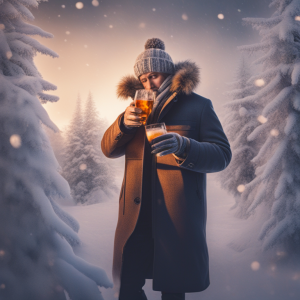Understand the Serious Dangers of Consuming Alcohol in Freezing Temperatures
As we endure the harsh realities of winter, especially in severely cold climates, the natural urge to seek warmth may lead many to turn to alcohol for comfort. However, it is crucial to grasp the significant risks that come with this decision. This article aims to highlight the dangers of alcohol consumption in icy environments, underscoring why this behavior is not only perilous but also ineffective in maintaining your body temperature. By enhancing your understanding of these dangers, you can make informed choices that prioritize your safety and well-being during the treacherous conditions of winter.
Before exploring the associated dangers, it’s vital to dispel the common myth that alcohol can provide warmth. When consumed, alcohol causes vasodilation, which expands blood vessels near the skin’s surface, initially giving a false sense of warmth. Although this sensation may feel comforting, it fails to support the essential need for maintaining a stable internal body temperature. In reality, alcohol consumption can severely hinder your ability to withstand cold temperatures, significantly escalating the risk of critical conditions like hypothermia and other serious health problems.
 One of the most alarming dangers of drinking alcohol in cold environments is the heightened risk of dehydration. Alcohol acts as a diuretic, promoting increased urine production and leading to significant fluid loss. Additionally, the cold air commonly associated with winter conditions is typically drier, resulting in an accelerated loss of moisture from our bodies. When these elements combine, they can cause dangerously low hydration levels, which are critical for sustaining overall health and survival. Dehydration not only negatively affects physical performance but also impairs cognitive functions, making it increasingly difficult to think clearly and make sound decisions in emergencies.
One of the most alarming dangers of drinking alcohol in cold environments is the heightened risk of dehydration. Alcohol acts as a diuretic, promoting increased urine production and leading to significant fluid loss. Additionally, the cold air commonly associated with winter conditions is typically drier, resulting in an accelerated loss of moisture from our bodies. When these elements combine, they can cause dangerously low hydration levels, which are critical for sustaining overall health and survival. Dehydration not only negatively affects physical performance but also impairs cognitive functions, making it increasingly difficult to think clearly and make sound decisions in emergencies.
Recognize How Alcohol Consumption Affects Decision-Making and Awareness in Cold Weather
Another significant consequence of alcohol consumption is its detrimental effect on cognitive function and decision-making abilities. In survival scenarios, the capacity to make clear-headed, rational decisions is vital for ensuring safety. Alcohol can cloud your judgment, making it increasingly challenging to respond effectively to potential hazards. This impaired reasoning can result in accidents and poor choices, which can prove disastrous when confronting extreme cold conditions. Staying alert and aware of your surroundings becomes essential; however, alcohol diminishes this need, leading to a greater likelihood of errors that could jeopardize personal safety.
Furthermore, alcohol disrupts the body’s innate ability to maintain its temperature. Upon ingestion, alcohol causes blood vessels in the skin to expand, resulting in increased heat loss. While this might create a temporary illusion of warmth, it ultimately accelerates the loss of core body heat, which is vital for survival. This creates a precarious cycle where fleeting warmth leads to a rapid drop in core temperature, significantly raising the risk of life-threatening conditions such as hypothermia. It is crucial to understand that despite the apparent short-term relief alcohol may provide against the cold, it ultimately enhances your vulnerability to severe cold-related health issues.
Explore the Alarming Relationship Between Hypothermia Risk and Alcohol Consumption
In discussing the dangers of hypothermia, it’s essential to recognize how alcohol can obscure the early warning signals of this serious condition. Hypothermia occurs when the body’s core temperature falls below the normal threshold, typically below 95 degrees Fahrenheit (35 degrees Celsius). Symptoms can manifest as shivering, confusion, fatigue, and loss of coordination. However, alcohol consumption suppresses our body’s natural responses, making it harder to detect these critical signs. By the time hypothermia symptoms become apparent, it may already be too late to avert severe injury or potentially fatal outcomes.
In winter survival scenarios, there are numerous safer and more effective alternatives to alcohol for maintaining your body warmth. Here are several strategies that can significantly enhance your ability to stay warm and safe:
1. Layer Your Clothing for Optimal Warmth: Wearing multiple layers of clothing is essential for effectively trapping warm air. Begin with thermal base layers, add insulating mid-layers, and finish with a windproof and waterproof outer layer to create a protective barrier against the cold.
2. Ensure Your Clothing and Footwear Remain Dry: Moisture can lead to rapid heat loss, so it’s crucial to keep your clothing and footwear dry at all times. Opting for waterproof materials and changing into dry garments whenever necessary will help sustain warmth.
3. Insulate Yourself from the Cold Ground: Utilizing sleeping mats or insulation pads can significantly minimize heat loss, particularly during sleep. This practice is vital for conserving body warmth during prolonged periods in chilly environments.
4. Choose Warm, Non-Alcoholic Beverages: Instead of turning to alcohol, consider enjoying hot drinks like tea, coffee, or hot chocolate. These beverages provide warmth without the negative repercussions associated with alcohol consumption.
5. Seek or Construct Shelter for Protection: Actively searching for or building a shelter can greatly reduce exposure to harsh winds and freezing temperatures. A well-constructed shelter is crucial for retaining body heat, significantly increasing your chances of staying warm.
6. Fuel Your Body with High-Calorie Foods: Consuming nutrient-rich foods that are high in calories can supply your body with the energy required to produce heat. Foods such as nuts and fatty fish are excellent sources of healthy fats that can be particularly beneficial in cold conditions.
Awareness of the dangers associated with alcohol consumption in freezing temperatures is essential for anyone involved in winter survival situations. Despite the transient feeling of warmth alcohol may provide, it can lead to dehydration, impaired judgment, disrupted temperature regulation, and mask hypothermia symptoms. By avoiding alcohol and employing safe, effective strategies, we can enhance our chances of surviving and thriving in harsh winter environments. Stay alert, prepare diligently, and prioritize your safety above all else.
The post Hazards of Alcohol Consumption in Extreme Cold Conditions appeared first on Survival Bite.
The Article Alcohol Consumption Hazards in Extreme Cold Conditions Was Found On https://limitsofstrategy.com


This article raises such an important point about the misconceptions surrounding alcohol consumption in extreme cold. Personally, I’ve experienced that deceptive warmth you described after having a drink outside during winter gatherings. It felt nice for a moment, but I quickly realized that the initial comfort doesn’t last.
It’s interesting how easy it is to overlook the real effects of alcohol in cold weather. That warmth you felt can be really deceptive; it’s almost like our brain tricks us into feeling cozy, while our body is losing heat. After a drink, we tend to underestimate the cold creeping in. It’s a classic case of mixing perception with reality.
This is an important topic that often gets overlooked in the cozy vibes of winter socializing. I find that many people still cling to the idea that a warm drink can be a perfect remedy for cold weather, despite the science showing otherwise. The initial rush of warmth from alcohol may create a deceptive sense of comfort, but as you noted, it can actually precipitate a drop in core body temperature due to increased blood flow to the skin, which isn’t ideal when you’re already dealing with freezing conditions.
You make a really interesting point about the cozy vibes of winter socializing masking some important health considerations. I think a lot of us have grown up with that classic idea of a warm drink, especially something alcoholic, being the go-to for beating the chill. It’s almost like this cultural ritual we’ve built around cold weather, where a hot toddy or mulled wine becomes synonymous with comfort.
Speaking of overlooked topics, I came across some essential insights on mould growth after water damage that really shed light on the hidden issues winter conditions can bring.
‘Mould Growth Speed: Essential Insights Post-Water Damage’
https://brokendolls.org/mould-growth-speed-essential-insights-post-water-damage/.
You bring up such an interesting point about how ingrained those cozy traditions are in our winter lives. It’s fascinating to think about how a hot drink, especially those with a little kick, has become more than just a remedy for the cold; it really does embody comfort and connection. It’s almost like our way of ritualizing warmth when the world outside feels so stark and chilling. But as you mentioned, those comforting vibes can sometimes cloud our awareness of the health implications, both from the alcohol itself and the environment we create around ourselves during this time.
You really nailed it when you talked about how those cozy traditions wrap around us like a warm blanket during winter. There’s something so comforting in the idea of curling up with a hot drink, especially when it comes with memories—whether it’s sharing a mulled wine with friends at a holiday gathering or enjoying a spiked hot cocoa after an icy day outside.